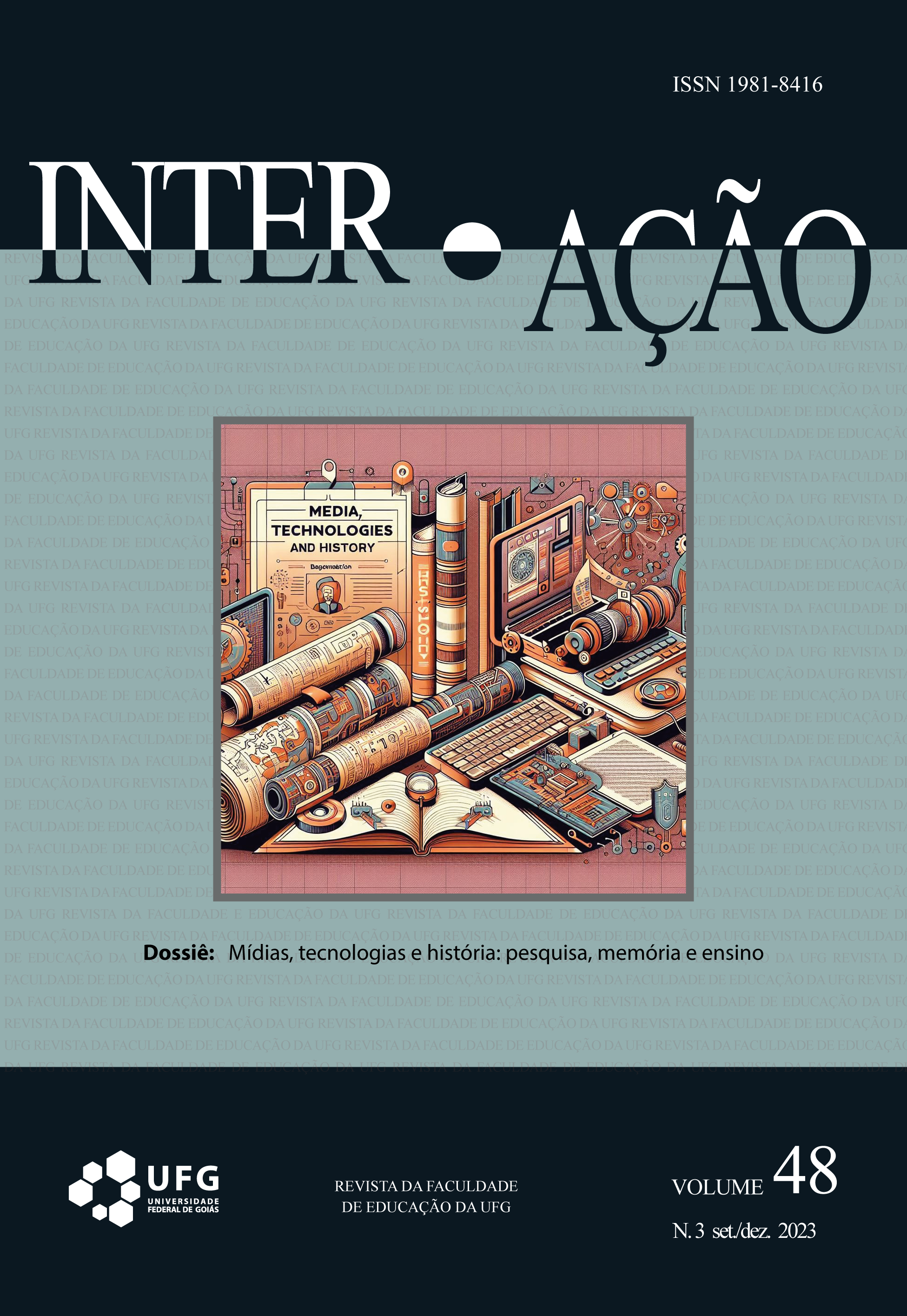FOR A (NON)REINVENTION OF EDUCATION: ARTIFICIAL INTELLIGENCE AND THE DISPLACEMENT OF THE ROLE TRADITIONALLY ATTRIBUTED TO THOSE WHO TEACH
DOI:
https://doi.org/10.5216/ia.v48i3.75784Abstract
This article had as its goal to revisit, through a narrative literature review, different historical moments, from the 15th to the 21st centuries, in which the emergence of new technologies and/or social changes led to new ways of understanding, conceptualizing, and practicing education, until finally reaching the new questions that chatbots such as ChatGPT raise, the main one being: to what extent Artificial Intelligence can replace human teachers? It was concluded that, as a tool, ChatGPT and other similar models represent a considerable potential when it comes to being applied as part of educational practices conducted in school environments. It was also concluded that, instead of replacing the teacher, such tools will most likely require a new displacement of their function, in which competence and creativity to formulate complex questions should be highly valued.
KEYWORDS: Education; Technological Innovations; Artificial Intelligence; ChatGPT.
Downloads
References
ARANHA, Maria Lúcia de Arruda. Filosofia da educação. São Paulo: Moderna, 1996.
ARIELI, Inbal. Chutzpah: Why Israel is a Hub of Innovation and Entrepreneurship. New York: Harper Collins, 2019.
ARISTÓTELES. Retórica. Madrid, Espanha: Instituto de Estudios Politicos, 1953.
BRIGGS, Asa; BURKE, Peter. Uma história social da mídia: de Gutenberg à Internet. 2 ed. Rio de Janeiro: Zahar, 2004.
CAMPOS, Carolina Rocha de. Uma vida em troca de likes: Uma análise do canal do YouTube de Taciéle Alcolêa. Dissertação (Mestrado em Comunicação e Cultura) – Programa de Pós-Graduação em Comunicação e Cultura, Universidade de Sorocaba, São Paulo, 2020. Disponível em: https://uniso.br/mestrado-doutorado/comunicacao-e-cultura/dissertacoes/2020/carolina-rocha-de-campos.pdf. Acesso em: 24 fev. 2022.
COMENIUS, Amóz. Didática Magna. Tradução: Ivone Carvalho Benedetti. 4 ed. São Paulo: WMF Martins Fontes, 2011.
CSIKSZENTMIHALYI, Mihaly. Creativity: the psychology of discovery and invention. 1 ed. New York: Harper Perennial, 1996.
FREIRE, Paulo. Pedagogia do Oprimido. 38 ed. Rio de Janeiro: Paz e Terra, 2004.
FREIRE, Paulo. Pedagogia da autonomia: saberes necessários à prática educativa. 57 ed. Rio de Janeiro/São Paulo: Paz e Terra, 2018.
GOMES, Eustáquio. País tem história universitária tardia. Jornal da UNICAMP. 191 – ANO XVII – 23 a 29 de setembro de 2002. Disponível em: https://www.unicamp.br/unicamp/unicamp_hoje/ju/setembro2002/unihoje_ju191pag7a.html. Acesso em: 2 mar. 2023.
HISTEDBR. Grupo de Estudos e Pesquisas História, Sociedade e Educação no Brasil. Faculdade de Educação. UNICAMP. Digitação elaborada por Luciana Aparecida da Silva. Ratio Studiorum. O Método pedagógico dos jesuítas: O “Ratio Studiorum”. Organização e plano de estudos da Companhia de Jesus. Disponível em: https://www.histedbr.fe.unicamp.br/o-metodo-pedagogico-dos-jesuitas-o-ratio-studiorum-leonel-franca-sj. Acesso em: 3 mar. 2023.
INTRODUCING ChatGPT. Disponível em: https://openai.com/blog/chatgpt. Acesso em: 2 mar. 2023.
JIMENEZ, Kayla. ‘This shouldn’t be a surprise’: The education community shares mixed reactions to ChatGPT. USA Today, 2023. Disponível em: https://www.usatoday.com/story/news/education/2023/01/30/chatgpt-going-banned-teachers-sound-alarm-new-ai-tech/11069593002/. Acesso em: 2 mar. 2023.
JOHNSON, Steven. De onde vêm as boas ideias: Uma breve história da inovação. Rio de Janeiro: Zahar, 2021.
MAN, John. A revolução de Gutenberg: a história de um gênio e da invenção que mudaram o mundo. Rio de Janeiro. Ediouro, 2004.
MANACORDA, Mario Alighiero. História da educação: da Antiguidade aos nossos dias. 13 ed. São Paulo: Cortez, 2022.
METZ, Cade. Why do A.I. chatbots tell lies and act weird? Look in the mirror. The New York Times, 2023. Disponível em: https://www.nytimes.com/2023/02/26/technology/ai-chatbot-information-truth.html#:~:text=It%20may%20be%20a%20chatbot's,groundwork%20for%20modern%20artificial%20intelligence. Acesso em: 26 fev. 2023.
MORI, Masahiro. The Uncanny Valley: The Original Essay by Masahiro Mori. IEEE Spectrum, 2012. Disponível em: https://spectrum.ieee.org/the-uncanny-valley. Acesso em: 27 fev. 2023.
ROOSE, Kevin. A conversation with Bing’s chatbot left me deeply unsettled. The New York Times, 2023. Disponível em: https://www.nytimes.com/2023/02/16/technology/bing-chatbot-microsoft-chatgpt.html. Acesso em: 26 fev. 2023.
SANTOS, Roger dos. Educação superior, gamificação e emulação: a dimensão
estética do jogo e da aprendizagem. Tese (Doutorado em Educação) – Universidade de Sorocaba, Sorocaba, SP, 2021. Disponível em: https://uniso.br/mestrado-doutorado/educacao/teses/2021/roger-dos-santos.pdf. Acesso em: 01 out. 2023.
SCHLIEMANN, Ana Laura; ANTÔNIO, Jorge Luiz (Orgs.). Metodologias ativas na Uniso: formando cidadãos participativos. Sorocaba, SP: Eduniso, 2016.
SOARES, Cristine. Metodologias ativas: uma nova experiência de aprendizagem. São Paulo: Cortez, 2021.
SOUSA, Jorge Pedro. Uma história breve do jornalismo no Ocidente. Biblioteca On-Line de Ciências da Comunicação, 2008. Disponível em: http://www.bocc.ubi.pt/pag/sousa-jorge-pedro-uma-historia-breve-do-jornalismo-no-ocidente.pdf. Acesso em: 20 mar. 2018.
VIGOTSKY, L. S. A formação social da mente: o desenvolvimento dos processos psicológicos superiores. 4 ed. São Paulo: Martins Fontes, 1991.
Published
How to Cite
Issue
Section
License
Copyright (c) 2023 Roger dos Santos, Guilherme Augusto Caruso Profeta, Rogério Augusto Profeta

This work is licensed under a Creative Commons Attribution-NonCommercial 4.0 International License.
Inter-Ação uses the Creative Commons Attribution 4.0 License for Open Access Journals (Open Archives Initiative - OAI) as the basis for the transfer of rights. Open access means making documents available on the Internet free of charge, so that users can read, download, copy, distribute, print, search, or link to the full text of documents, process them for indexing, use them as input data for software programs, or use them for any other lawful purpose, without financial, legal, or technical barriers.
Authors publishing in this journal agree to the following conditions:
1) Authors retain copyright and grant the journal the right of first publication, with the work simultaneously licensed under the Creative Commons Attribution License, which permits redistribution of the work with attribution and first publication in this journal.
2) Authors are permitted to enter into additional, separate agreements for non-exclusive distribution of the version of the work published in this journal (e.g., for publication in an institutional repository or as a book chapter), with attribution and first publication in this journal.
3) Authors are permitted and encouraged to publish and distribute their work online (e.g. in institutional repositories or on their home page) at any time before or during the editorial process, as this may generate productive changes as well as increase the impact and citation of the published work.















